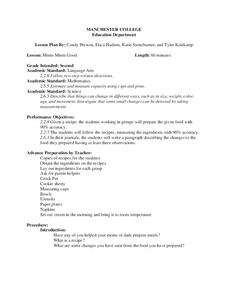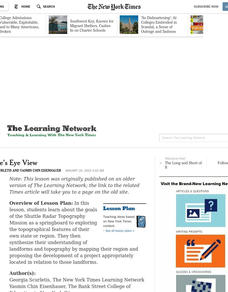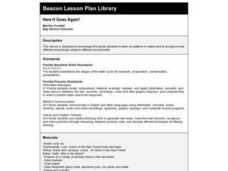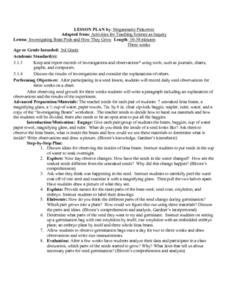Curated OER
Remote Control
Students explore and evaluate several distance learning Web sites. They defend whether or not they would like to participate in the distance learning experience by either writing a proposal for including this distance learning project...
Curated OER
Are You a Frog?
Students listen to the book "Ask Me If I'm a Frog, and compare their anatomy and habits to the anatomy and habits of a frog to identify with the characteristics unique to frogs. They respond to teacher-generated questions by writing...
Curated OER
Evolution
Students investigate the concept of evolution and its implications upon the origin and development of life. They conduct research using a variety of resources while focusing upon cross-over and mutations. The information is used to set...
Curated OER
The Appearance of the Moon
Third graders watch a demonstration on how craters were formed on the moon. Individually, they care given a set of materials that represent the moon surface and make their own craters. To end the lesson, they measure the size of the...
Curated OER
Balancing Bottles
Students explore the Law of Conservation of Matter using effervescent tablets. In this mass and energy lesson, students investigate how mass is conserved in the reaction of effervescent tablets and water. They will discuss and...
Curated OER
Introduction To Bug Collecting
Students explore process of live collection of insects and spiders using sweep nets, aerial nets, and beating sheets. they collect, examine and release several different types of insects or spiders then compare their journal drawing of...
Curated OER
That Is a Lot of Rain
Students investigate the amount of rainfall in Manu, Peru. They view and discuss a video and fill a rain guage with the amount of rainfall in Manu. They research and compare local rainfall amounts to those of Manu, and write about what...
Curated OER
Heat Loss and Cool Gains
Fifth graders predict what happens when cold and hot water are mixed together. In this physics lesson plan, 5th graders discuss how heat transfer takes place. They record temperature readings and compare it with their prediction.
Curated OER
Reduce, Reuse, Recycle
Young scholars understand the process of recycling. They investigate how it improves the environment. They read the story "Don't Pollute" by Stan and Jan Berenstein. They analyze trash and sort it into bins.
Curated OER
Going Local with Global Warming
Students examine climate change by using recent temperature records. In this data analysis lesson students plot weather data and study the differences between weather and climate.
Curated OER
Don’t Cry Over Spoiled Milk!
Seventh graders explore how milk spoils over time. In this biology lesson, 7th graders discover how pH changes as microorganisms enter the food and multiply. They explain the benefits of pasteurization process.
Curated OER
How Hot Is Hot In Namib?
Students research and demonstrate the temperatures of the Namibian Desert. They watch and discuss a video, conduct an experiment to demonstrate the desert temperatures, record their results in the form of a graph, and compare/contrast...
Curated OER
The Water Cycle
Fifth graders investigate evaporation, condensation, and precipitation. They observe a water cycle kit and record their observations, and examine how water condenses on the outside of a cup. Next, they observe an evaporation...
Curated OER
A Place for the Birds
Students reflect on bird migrations and develop a project to collect data on bird species from across North America to further investigate the ranges and migrations of common birds. They create a field guide of North American birds.
Curated OER
Reptiles
Students investigate reptiles and reptile habitats. They listen to books, cut out magazine pictures of reptiles from National Geographic, sort plastic animals into the categories of mammal, reptile, or amphibian, watch a National...
Curated OER
The Water Cycle
Fifth graders identify organisms and processes involved in three cycles: the water cycle, the carbon cycle, and the nitrogen cycle. They produce a pictorial or abstract water cycle, and appropriately place life forms onto an existing...
Curated OER
The Climate Change Skeptic's Argument: Natural Solar Cycles or Human Activity?
Teachers explore patterns in sunspots and total solar irradiance to understand the counterpoint to the human effect of global warming. In this professional development tool, teachers work through a lesson on the sun's natural...
Curated OER
Mmm Mmm Good
Second graders follow a recipe. For this cooking lesson, 2nd graders are given a recipe and ingredients to prepare food. Students will reflect on their experience in their journals.
Curated OER
Sugar Solutions
Seventh graders study biological systems and how they reach equilibrium. In this system balance lesson students divide into groups and complete an osmosis lab activity.
Curated OER
A Shuttle's Eye View
Students explore the goals of the Shuttle Radar Topography Mission as a springboard to exploring the topographical features of their own state or region. They synthesize their understanding of landforms and topography by mapping their...
Curated OER
Here It Goes Again!
First graders work on patterns in nature and to recognize how different living things adapt to different environments such as the rain forest.
Curated OER
Arthropods at Home- Spider, Isopod, or Any Arthropod
Students design a habitat for an arthropod. In this organisms lesson, students read the book, A House is a House For Me. Students find an arthropod and create a terrarium.
Curated OER
Electricity and Energy
Learners demonstrate that electricity can flow in a circuit. They demonstrate safe practices during lab investigations.
Curated OER
Investigating Bean Pods and How They Grow
Third graders observe and create a record of seed growth over time. After planting a seed, 3rd graders record their observations of the seed's growth over a three week period. Upon conclusion of the experiment, they write a paragraph...























